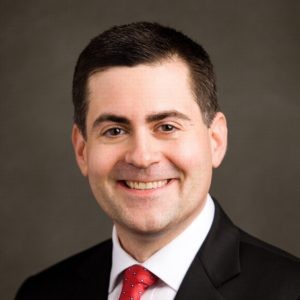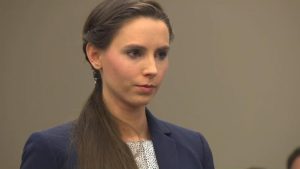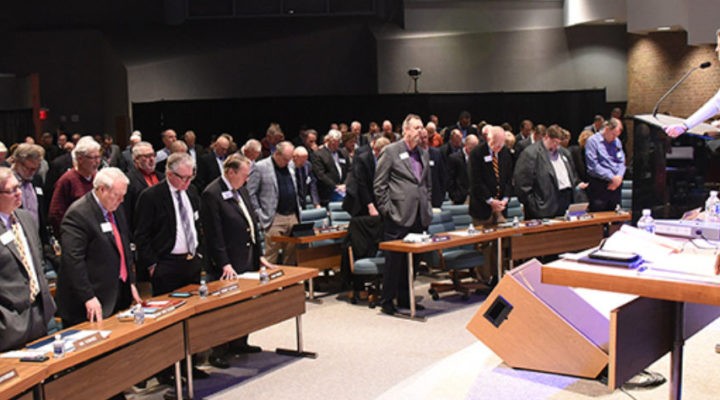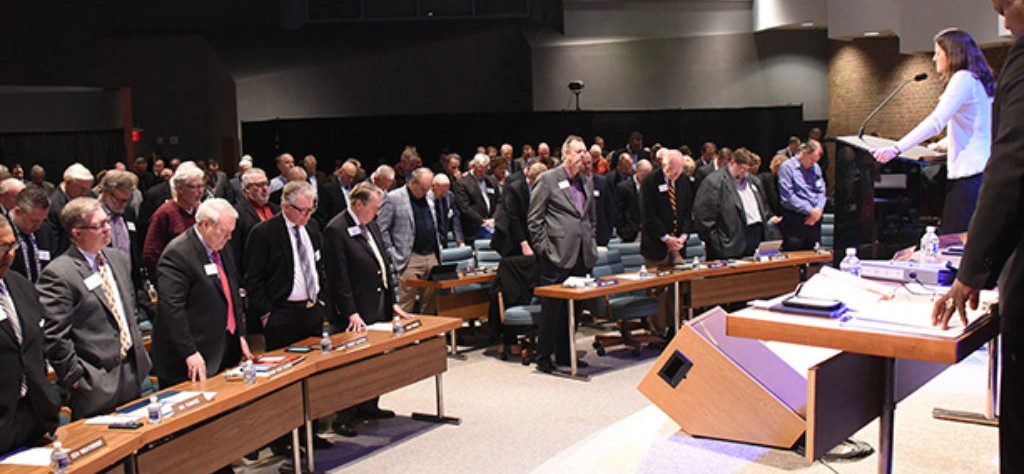The most powerful coordinating committee at the heart of the Southern Baptist Convention will become the subject of a convention-mandated, third-party investigation if two SBC pastors get their way next week.
Ronnie Parrott, pastor of Christ Community Church in Huntersville, N.C., and Grant Gaines, pastor of Belle Aire Baptist Church in Murfreesboro, Tenn., have announced their intention to ask messengers to the SBC annual meeting in Nashville to authorize an investigation of the SBC Executive Committee.
The cause of the investigation is allegations of “mishandling sexual abuse victims, a pattern of intimidation and resistance to sexual abuse reform initiatives.”
The motion would require the newly elected SBC president to “appoint a task force to hire a third party to investigate” the Executive Committee. And depending on the outcome of a four-person race for the presidency, the new president required to appoint such a task force could be one of the prime targets of the investigation itself.

Mike Stone
Mike Stone, a Georgia pastor who is the candidate of the newly formed Conservative Baptist Network, was chairman of the SBC Executive Committee when some of the alleged misdeeds happened. Further, his candidacy and the organization endorsing him were created in part by Paige Patterson, who was fired from the presidency of an SBC seminary over allegations of mishandling sexual abuse claims.
Both Stone and Patterson have become lightning rods in a long-simmering but newly exploded crisis over the SBC’s lack of robust response to sexual abuse. That crisis will come to an apex when more than 13,000 messengers (the SBC’s term for voting members) convene in-person for the annual meeting June 14-15.
If the motion to investigate the Executive Committee is approved as currently written, it would require a full accounting no later than the 2022 annual meeting and would include “suggestions for actions to be taken by our convention.”
The context
Debate over handling of sexual abuse allegations is far from the only controversial topic on the agenda for the Nashville meeting. Already, additional crises are brewing over race and gender, national politics, a lawsuit brought against one of the SBC’s mission boards, and a proposed retooling of the business and financial plan that governs the denomination — not to mention a 14th consecutive year of membership decline.

Russell Moore
However, the concerns about the Executive Committee jumped to the forefront last week when a February 2020 letter written by Russell Moore, then head of the SBC Ethics and Religious Liberty Commission, was leaked. That letter, which was sent to ERLC trustees, outlines sweeping and damning allegations of a campaign of intimidation against Moore and the ERLC — particularly over the agency’s role in acknowledging and responding to problems of sexual abuse within the denomination.
Baptist News Global received a copy of the letter several days before its eventual publication by Religion News Service but had not been able to verify its authenticity over a holiday weekend. BNG still has not published the letter, although copies of it now are widely available online and its authenticity has not been disputed by Moore or ERLC trustees.
What (and who) is the SBC Executive Committee?
Within the vast governance structure of the SBC sits a once-little-noticed elected board that has in recent years accumulated more power than at any other time in modern history. Members of the Executive Committee are elected by the SBC in annual session, just like trustees of other SBC agencies and institutions. And in Baptist polity, all those organizations and their governing boards operate with autonomy — meaning no other organization or board can tell another what to do.
That began to change two decades ago, however, when the Executive Committee demanded that all the SBC entities amend their bylaws to make the SBC the “sole member” of their corporations. This is legal terminology to say that while the elected trustees of each entity have day-to-day governance of their organizations, the SBC itself is the ultimate authority and can overrule them. It also means they cannot secede from the denomination.
The “Southern Baptist Convention” technically exists only two days a year when the convention sits in annual session.
There’s a problem with this policy, however, because the “Southern Baptist Convention” technically exists only two days a year when the convention sits in annual session. Messengers to each year’s convention are the “convention.”
On the remaining 363 days of the year, the Executive Committee acts “on behalf of” the convention, making decisions that cannot wait until the next annual meeting. This is the source of tremendous power within the nation’s largest non-Catholic denomination.
The Executive Committee is made up of both a full-time paid staff of 32 people and 86 elected trustees who serve as volunteers. It receives and distributes all gifts to the SBC’s unified budget, called the Cooperative Program, as well as most special gifts, accounting for hundreds of millions of dollars annually. The Executive Committee also runs the SBC’s news service, Baptist Press.
The Executive Committee and the ERLC
Several SBC agencies, including the Executive Committee and the ERLC, share a building in downtown Nashville. In happier times, they also have shared collegiality.
That collegiality came to a screeching halt in 2020, just before the coronavirus pandemic hit, when Stone as chair of the Executive Committee created a task force to investigate the ERLC and named himself chair of the task force. The investigation was done under the banner of concern about declining gifts to the Cooperative Program, with accusations that Moore and the ERLC were taking positions unpopular with SBC churches that were, in turn, withholding or reducing their giving to the denomination.
Some of the concerns about Moore and the ERLC were vague, but others were specific, including the fact that Moore had become a never-Trumper, clearly denouncing Donald Trump as morally unfit for the presidency while still endorsing the core tenets of the Republican Party.
Although the Executive Committee took no action against Moore or the ERLC, three months later Moore announced his resignation.
In February 2021, Stone and the Executive Committee came back with a report that laid blame on the ERLC for decreasing Cooperative Program giving and for creating division within the SBC. The report infuriated ERLC trustees and Moore’s supporters.
Although the Executive Committee took no action against Moore or the ERLC, three months later Moore announced his resignation, which took effect June 1. He has been named to a public theology role with Christianity Today magazine and with a large nondenominational church in Nashville.
The leaked letter
On Feb. 24, 2020, one week after the Executive Committee had authorized the investigation of Moore and the ERLC, Moore wrote a nine-page letter to his trustees explaining from his perspective what had happened. The letter is detailed and direct.
He quickly singles out one person — Stone — as the driver of the investigation.
“The lazy journalistic assessment would be that this is about the president of the United States,” Moore wrote. “This has nothing to do with that. … Most Trump voters and supporters have been nothing but kind and encouraging to me.”
Instead, he wrote, “the presenting issue here is that, first and foremost, of sexual abuse. This Executive Committee, through their bylaws workgroup, ‘exonerated’ churches, in a spur-of-the-moment meeting, from serious charges of sexual abuse cover-up. One of those churches actively had on staff at the time a sex offender. J.D. Greear, our SBC president, and I were critical of this move, believing that it jeopardized not only the gospel witness of the SBC, but, more importantly, the lives of vulnerable children in Southern Baptist churches.”

Rachael Denhollander
Concern about the sexual abuse crisis — which was laid bare in a 2019 expose in the Houston Chronicle — caused Moore and the ERLC to host a national conference addressing the problem. One of the speakers there was Rachael Denhollander, a star witness in the trial of serial sex offender and former U.S. gymnastics doctor Larry Nassar.
At the October 2019 “Caring Well” conference, Moore interviewed Denhollander, who told the story of her friend Jen Lyell, then an executive at Lifeway Christian Resources, an SBC entity also located in Nashville. Denhollander said Lyell made the hard decision to publicly disclose her story of being sexually abused by a former seminary professor in order to keep him from simply moving on to another ministry position to prey on others. Lyell alleged that story was then misrepresented in Baptist Press, which is part of the Executive Committee.
In his letter, Moore explained that while interviewing Denhollander, “I refused to censor or stop anything that she had to say. In that conversation, she spoke about her thoughts about the disparagement and poor treatment of a sexual abuse survivor by Executive Committee staff. The story Rachael told is accurate, and Maria and I know that because we were, even during that very meeting, ministering alongside others to that mistreated young woman.”
Then he added this accusation: “This enraged some Executive Committee trustee leadership, who communicated that they were incensed that we would allow such a story to be told. That was communicated with special outrage since the Executive Committee had contributed some money to Caring Well as a reason why we should not have allowed this story to be told. I came away from these conversations with the distinct feeling that I was being told …, ‘You’ve got a nice little Commission there; would be a shame if something happened to it.’”
Moore said “the same people enraged” at him “also were enraged” at Greear.
Moore told his trustees he was not alone in this mistreatment, however. He cited the case of SBC President J.D. Greear, who had advised churches not to honor Paige Patterson after his dismissal by trustees of Southwestern Baptist Theological Seminary for making light of and mishandling reports of sexual abuse.
Moore said “the same people enraged” at him “also were enraged” at Greear. “The same people who moved to create our ‘investigative task force’ wanted to censure J.D.”
Moore’s letter also identified concerns about his stance on racial issues as motivating the investigation.
“My family and I have faced constant threats from white nationalists and white supremacists, including within our convention. Some of them have been involved in neo-Confederate activities going back for years. Some are involved with groups funded by white nationalist nativist organizations. Some of them have just expressed raw racist sentiment, behind closed doors. They want to deflect the issue to arcane discussions that people do not understand, such as ‘critical race theory.’ There is no Southern Baptist that I know, of any ethnicity, who is motivated by any critical theory but by the text of Ephesians and Galatians and Romans, the Gospels themselves, the framework of Revelation chapters four and five.”
Specific accounts Moore told in the letter about disparaging comments on race have since been publicly linked to Patterson and to Paul Pressler, who worked together to create the so-called “conservative resurgence” in the SBC that began in 1979.
Stone’s response
Stone, pastor of Emmanuel Baptist Church in Blackshear, Ga., issued a response to Moore on his personal website. He called the leaked letter a “back-door press release” and said it was “filled with mischaracterizations of who Southern Baptists are. The release of the letter is clearly an attempt to influence the upcoming presidential election in the SBC. And I think Southern Baptists can see this letter for exactly what it is.”
Further, Moore’s letter “contains numerous misrepresentations of me and of the leadership of our beloved convention,” Stone wrote. “More broadly, it illustrates that he holds a markedly different view of the Southern Baptist Convention than the one held by the overwhelming majority of our 14 million members who have generously paid his salary.”
“It illustrates that he holds a markedly different view of the Southern Baptist Convention than the one held by the overwhelming majority of our 14 million members who have generously paid his salary.”
Stone denied that creation of the Executive Committee task force to investigate the ERLC was a unilateral action on his part and said such a claim is “a deflection from the fact that Russell’s leadership of the ERLC has been an ongoing source of division and distraction for Southern Baptists.”
Meanwhile, at the website of the Conservative Baptist Network, which is promoting Stone for the SBC presidency, Stone’s leadership in investigating and calling out Moore is listed as a virtue.
“Knowing the groundswell of Southern Baptist concern over the leadership and direction of the ERLC, Pastor Mike Stone led a task force to evaluate objectively the effect the ERLC is having on the Cooperative Program of the Southern Baptist Convention,” the site explains. “Pastor Mike Stone did not just talk about the issues. He boldly acted in the face of great opposition. That is the very kind of leadership that is critically needed at this hour. We would do well to remember this as we vote for the next president of our Southern Baptist Convention.”
A second leaked letter
Amid the back-and-forth over Moore’s 2020 letter to his trustees, a second letter written by Moore dated May 31, 2021, also surfaced online. The second letter was addressed to SBC President Greear.
It gives further evidence of what Moore calls the Executive Committee leadership’s efforts to “stonewall” plans to address sexual abuse within the SBC.

Ronnie Floyd
The second letter also mentions Ronnie Floyd, president of the Executive Committee. Floyd, who is a paid staff leader for the organization, issued a statement through Baptist Press saying: “For those matters of which I was present, I do not have the same recollection of occurrences as stated.” But he added: “I do take seriously allegations in this letter which may raise concern for Southern Baptists.”
Greear acknowledged that he had received the letter from Moore but treated it as private correspondence.
“I was aware of some things contained in the letter, but not everything, although my own struggles with the Executive Committee related to some of these initiatives are well documented,” he said. “I know churches in our convention both want and deserve the truth on these matters, and I expect these things to come up at our annual meeting next week.”
All eyes on Nashville now
Stone and the Conservative Baptist Network have called for a “second conservative resurgence” in the SBC to correct the liberalism they believe Moore and others like him have brought into the convention. That is their platform for the presidential race this year, with Stone as the standard bearer.
Yet many of the SBC’s younger pastors were not yet born when Patterson and Pressler launched their movement to take control of the SBC in 1979. Some weren’t even born when the moderate wing of the SBC broke away in 1990 to form the Cooperative Baptist Fellowship.

Cody Glen Barnhart
One such pastor is Cody Glen Barnhart, director of worship and music at First Baptist Church of Alcoa, Tenn. The 25-year-old wrote this week in SBC Voices about his perspectives as someone raised Southern Baptist and loyal to the cause today. SBC Voices is a blog site run by pastors opposed to the Conservative Baptist Network and more in favor of Moore’s style of theology.
Although he wasn’t alive when it happened, Barnhart recounted the story of Patterson and Pressler meeting at Café Du Monde in New Orleans in 1978 to devise their plan to take control of the denomination.
“The SBC made its bed at Café Du Monde. Now, we’re sleeping in it — and we shouldn’t be surprised we can’t sleep soundly,” Barnhart wrote. “As I have matured, I have found myself increasingly uncomfortable with the way the conservative resurgence was celebrated throughout my education and various Baptist institutions. … For a denomination whose primary focus is cooperation, we sure seem hellbent on making sure the ‘right people’ keep all the power. It happened then, and it is happening now.”
“We need a new resurgence that can bear the weight of theological change without requiring a cutthroat politicism,” he added. “We need to demand better of our leaders. We need to be done with covering up our leaders’ disqualifications so that they may preserve their reputations and prolong their office.”
Then returning to the theme of sexual abuse, Barnhart noted he has seen “multiple friends experience sexual abuse at the hands of their pastor.”
He concludes: “The things I’ve seen over these two decades as a Baptist have taught me one lesson: Where a power structure can be wielded for good, a power structure can be wielded for evil. I pray to God we wield it for good in Nashville this year.”
Related articles:
Woman in SBC leadership post says #MeToo
Caring well? Speaker says Baptist Press reported abuse disclosure as a consensual affair
There’s controversy again, and more people are attending the SBC annual meeting


